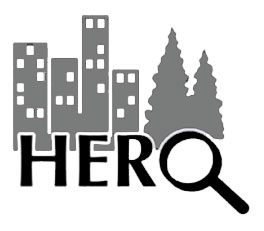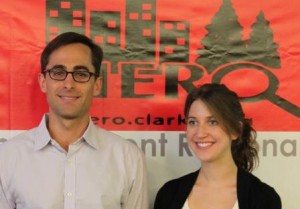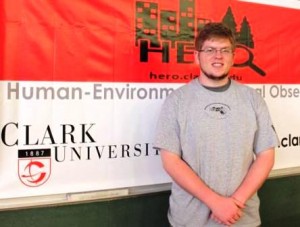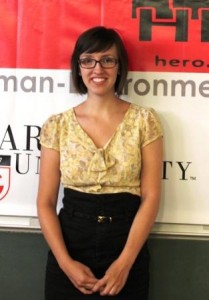 Being a HERO at Clark University doesn’t require having superpowers or wearing a cape, but it helps to have a sharp mind for scientific research and a keen interest in the environment. A good raincoat and sturdy boots also may come in handy. For more than a decade, the Human-Environment Regional Observatory (HERO) program at Clark University has provided a unique undergraduate research experience, focusing on and spanning social, ecological, and mapping sciences. The common intellectual thread among these HERO domains is the study of land-use and land-cover change, long a topic of Clark research expertise.
Being a HERO at Clark University doesn’t require having superpowers or wearing a cape, but it helps to have a sharp mind for scientific research and a keen interest in the environment. A good raincoat and sturdy boots also may come in handy. For more than a decade, the Human-Environment Regional Observatory (HERO) program at Clark University has provided a unique undergraduate research experience, focusing on and spanning social, ecological, and mapping sciences. The common intellectual thread among these HERO domains is the study of land-use and land-cover change, long a topic of Clark research expertise.
Undergraduates selected each year to become HERO Fellows conduct hands-on research under the mentorship of Clark faculty and master’s and Ph.D. students in the lab and in the field, joining what Professor Colin Polsky, Director of the program, calls a “community of effective practice.” They also enjoy the opportunity—relatively rare for undergraduates—to present their professional-level science in scholarly publications and at academic conferences across the country, including the annual meeting of the American Association of Geographers, which will next be held in Seattle (March 2011).

The 2010 HERO Fellows from Clark include Lilly Denhardt ’11; Abby Kaminski ‘ 11; Andrew (A.J.) Shatz ’12; and Olivia Tempest ’13 (currently a sophomore at Wesleyan). The Clark University HERO program has been supported through the leadership of then-Provost (now Clark President) David Angel. Each year, the HERO faculty members integrate the students into the faculty’s externally-funded research activities. The success of these activities translated into a successful three-year, $360,000 grant proposal to the U.S. National Science Foundation’s Research Experiences for Undergraduates Site (REU Site) program, which provided resources to further develop the program, including opening the program to students from around the country. Joining Clark’s 2010 HERO team, from among approximately one hundred applicants, are: Katrina Barney ’10, Eric Garton ’10, and Alma Pacheco ’10 (New Mexico State University); Sarah Geise ’11 (Carthage College, Wisconsin); Evan Markham ’10 (University of Vermont); Caitlin McCann ’11 (University of Texas, Austin); and Abigail Nehring ’12 (Bard College at Simon’s Rock, Mass).

The HERO-REU students embark on a demanding eight-week summer curriculum. The goal for every HERO fellow is to carry out a year-long research project, and to have that culminate in a written, oral and poster presentation. In late July, the students showcased their summer research findings at a public presentation at the Arthur M. Sackler Science Center in the Johnson Auditorium. Their topics included analyses of suburban lawns and water management, suburban sprawl and mapping flood plain areas; and application of remote sensing data and technology to monitor large-area forest cover change in New England. Along with Polsky, who is Clark’s Associate Dean for Undergraduate Research & Active Pedagogy and associate professor of Geography, are core program faculty members R. Gilmore Pontius Jr., associate professor of Geography and International Development, Community and Environment (IDCE); John Rogan, associate professor of Geography; and Deb Martin, associate professor of Geography.

This year, Kaminski and Shatz were named 2010-11 O’Connor HERO Fellows. The fellowship is named for the late Clark University Trustee John O’Connor (Class of ’78) who was a prominent Massachusetts environmentalist and community activist. Denhardt was selected as the Mosakowski HERO Fellow, an honor sponsored by the Mosakowski Institute at Clark, which is dedicated to improving the effectiveness of government and other institutions in addressing social concerns through the successful mobilization of use-inspired research. HERO program sponsors include the John T. O’Connor ’78 Endowed Fund for Environmental Studies, National Science Foundation, George Perkins Marsh Institute at Clark, National Oceanic and Atmospheric Administration’s National Marine Fisheries Service, and the Thoreau Foundation.
Since its founding in 1887, Clark University in Worcester, Mass., has a history of challenging convention. As an innovative liberal arts college and research university, Clark’s world-class faculty lead a community of creative thinkers and passionate doers and offer a range of expertise, particularly in the areas of psychology, geography, urban education, Holocaust and genocide studies, environmental studies, and international development and social change. Clark’s students, faculty and alumni embody the Clark motto: Challenge convention. Change our world.
